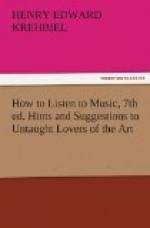[Sidenote: Simple terms confounded.]
It is not alone a knowledge of the constituent factors of a symphony, or the difference between a sonata and a suite, a march and a mazurka, that is rare. Unless you chance to be listening to the conversation of musicians (in which term I wish to include amateurs who are what the word amateur implies, and whose knowledge stands in some respectable relation to their love), you will find, so frequently that I have not the heart to attempt an estimate of the proportion, that the most common words in the terminology of the art are misapplied. Such familiar things as harmony and melody, time and tune, are continually confounded. Let us call a distinguished witness into the box; the instance is not new, but it will serve. What does Tennyson mean when he says:
“All night have the
roses heard
The flute, violin,
bassoon;
All night has the casement
jessamine stirr’d
To the dancers
dancing in tune?”
[Sidenote: Tune and time.]
Unless the dancers who wearied Maud were provided with even a more extraordinary instrumental outfit than the Old Lady of Banbury Cross, how could they have danced “in tune?”
[Sidenote: Blunders of poets and essayists.]
Musical study of a sort being almost as general as study of the “three Rs,” it must be said that the gross forms of ignorance are utterly inexcusable. But if this is obvious, it is even more obvious that there is something radically wrong with the prevalent systems of musical instruction. It is because of a plentiful lack of knowledge that so much that is written on music is without meaning, and that the most foolish kind of rhapsody, so it show a collocation of fine words, is permitted to masquerade as musical criticism and even analysis. People like to read about music, and the books of a certain English clergyman have had a sale of stupendous magnitude notwithstanding they are full of absurdities. The clergyman has a multitudinous companionship, moreover, among novelists, essayists, and poets whose safety lies in more or less fantastic generalization when they come to talk about music. How they flounder when they come to detail! It was Charles Lamb who said, in his “Chapter on Ears,” that in voices he could not distinguish a soprano from a tenor, and could only contrive to guess at the thorough-bass from its being “supereminently harsh and disagreeable;” yet dear old Elia may be forgiven, since his confounding the bass voice with a system of musical short-hand is so delightful a proof of the ignorance he was confessing.
[Sidenote: Literary realism and musical terminology.]




